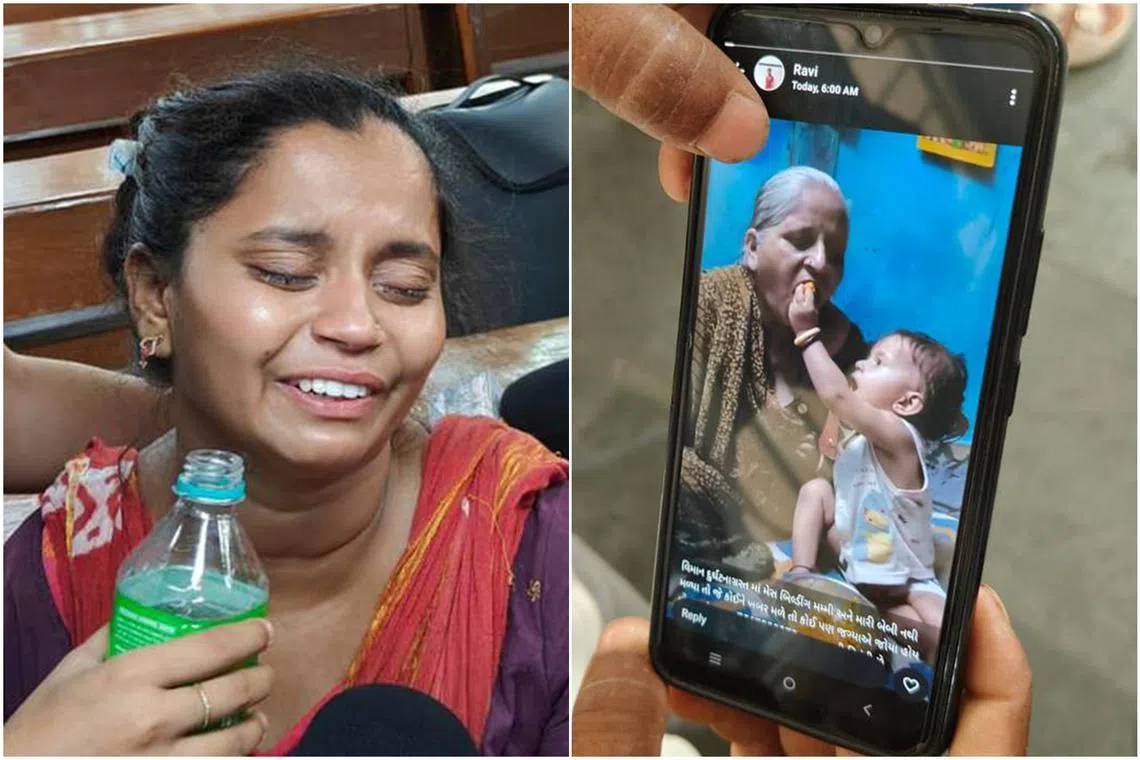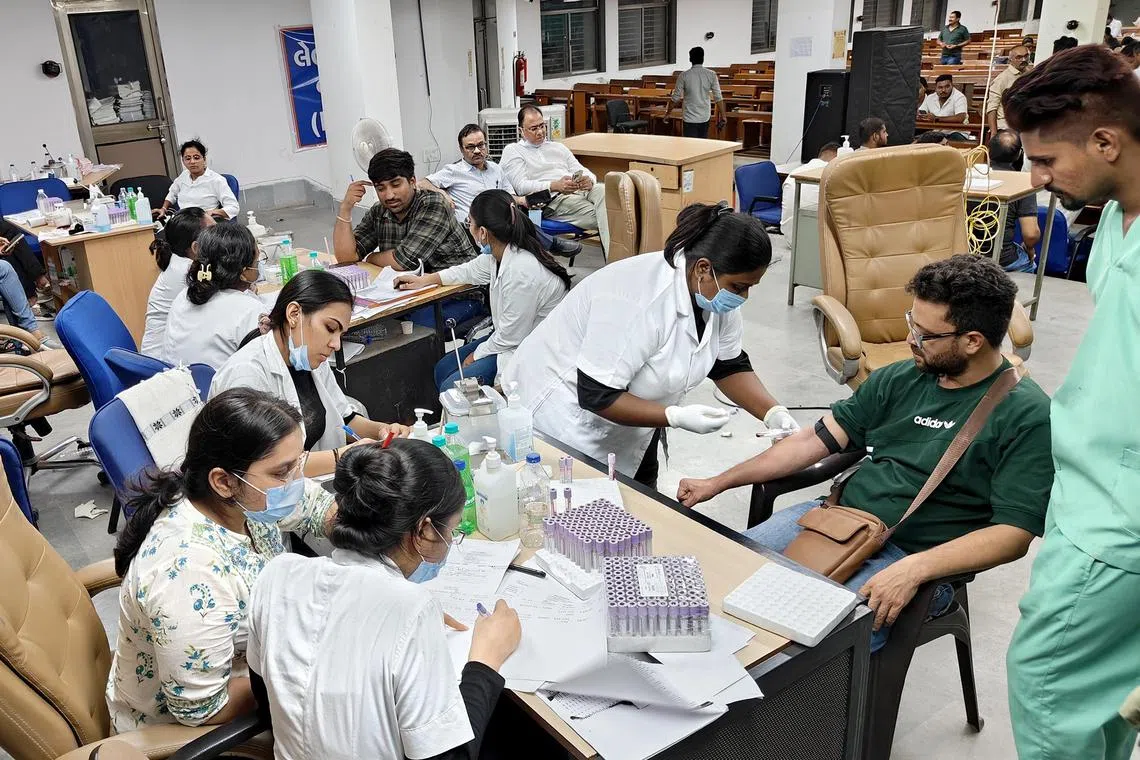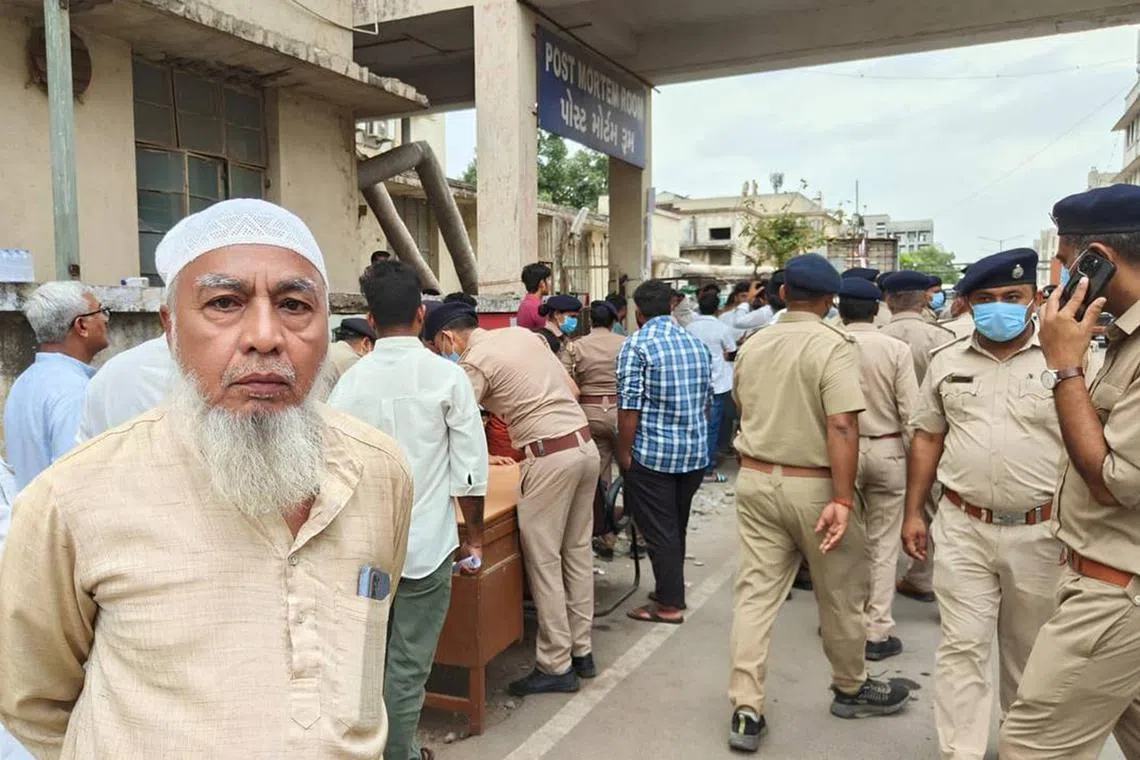‘My mind is just not ready to accept it’: Families of Air India crash victims grapple with loss, grief and shock
Sign up now: Get ST's newsletters delivered to your inbox

Ms Payel Thakor's mother, who works as a cook at the hostel mess the plane had rammed into, and two-year-old niece have been missing since the crash.
ST PHOTOS: DEBARSHI DASGUPTA
Follow topic:
AHMEDABAD – An agonising wait for family members of passengers aboard the ill-fated Air India Flight AI171 continues on the sprawling campus of the Civil Hospital in Ahmedabad, a day after the plane headed for London crashed in this western Indian city.
All but one of the 242 passengers and crew on board were killed, with an additional unconfirmed number of fatalities feared on the ground. The Boeing 787-8 Dreamliner had rammed into a hostel mess
Family and relatives have been trickling in from various parts of Gujarat, as well as outside the state, to submit their DNA samples
A large examination hall with wooden benches at the medical college serves as the round-the-clock impromptu DNA collection centre. Among those there at 3am on June 13 was Mr Imtiyaz Ali Syed, 42, who had driven nearly nine hours from Mumbai.
He hit the road right after he learnt of the crash, as the airport at Ahmedabad was shut for around two hours after the tragedy. His brother Javed Ali Syed, his wife and their two young children – all British nationals – were flying home after spending Eid with their ageing mother, who has not been told about the tragedy because of her fragile heart condition.
“Even my mind is just not ready to accept it,” he told The Straits Times. “But I have to accept it today or tomorrow or the day after. We have to accept it,” he added.
He appeared composed in media interviews before breaking down outside in the arms of friends who had accompanied him. Others just could not hold back their tears when speaking to the media.

Family and relatives have been trickling in to submit their DNA samples at Ahmedabad’s Byramjee Jeejeebhoy Medical College and Civil Hospital.
ST PHOTO: DEBARSHI DASGUPTA
Ms Payel Thakor, in her 20s, spoke in fits and starts while crying inconsolably. Her mother, who works as a cook at the hostel mess, and her two-year-old niece Aadya Thakor have been missing since the crash.
“We have gone mad looking for them everywhere,” she said. “There’s not a corner left in the Civil Hospital where we haven’t looked.”
She had been out delivering food for the doctors during their lunch break when the crash occurred, and initially mistook the loud noise for an explosion in the mess, which had a large stock of cooking gas cylinders.
“Everything was smashed. They just did not let us in despite us pleading to let us go and see our mother,” she told ST.
Her 31-year-old brother Ravi Prahladji Thakor, who also broke down while speaking, added that they are still hoping his 50-year-old mother and young daughter are alive. “But we have not got any information yet.”
Mr Munir Ahmed Chitthiwala, however, who was waiting outside the post-mortem room at the Civil Hospital, has accepted the painful loss of his elder brother Abdur Razak Chitthiwala, 81, who was on board AI171.
A retired Urdu teacher and headmaster of a government school, his brother was on his way to London to meet his son. Instead of hearing about a happy reunion, the younger Mr Chitthiwala was waiting to receive his elder brother’s body. “Everything else is secondary,” the 66-year-old told ST.

Mr Munir Ahmed Chitthiwala waiting outside the post-mortem room at the Civil Hospital. He has accepted the painful loss of his elder brother.
ST PHOTO: DEBARSHI DASGUPTA
Also enduring a wait was Mr Rizwan Vohra, 34, whose aunt, younger brother and five-year-old niece were on board the flight. They had bid each other farewell in a video call shortly before take-off.
“They were complaining about the air-conditioning system and the flight attendant call buttons not working, but they were told everything would be fine after take-off,” he said.
He had dropped them off at the airport and was on his way home in Vadodara, a city in Gujarat around 110km away, when a call from a relative telling him about the crash forced him to turn around.
“We are just hoping we get the bodies now as soon as possible, with the mercy of God and the kindness of the Indian government,” said Mr Vohra, who had been at the hospital for the past 24 hours.
He was upset that so many police officials had been deployed to ensure security for visiting politicians when they, he added, could have been asked instead to help speed up the process of identifying victims of the crash.
Officials and volunteers, including 300-odd members of the Rashtriya Swayamsevak Sangh, a Hindu right-wing socio-political organisation, have been working tirelessly to deal with the tragedy as efficiently and humanely as possible.
Among the volunteers was Ronit Singh, 32, a resident living nearby. He said it had been “very difficult” handling the tragedy.
“Bodies kept coming in, in ambulances. Some had no hands, others had no legs,” added Mr Singh. “We were lifting the bodies from the ambulance and putting them on stretchers and covering them with sheets to avoid them being exposed.”
Outside, the all too familiar but now eerie sound of aircraft flying overhead shortly after taking off from the nearby airport interrupted conversations, as heads turned upwards to look at the planes.
On the ground, snatches of multiple languages – Bengali, Malayalam, English and German, among others – emerged from the buzz as media crews from India and across the world converged at the hospital to report on the aftermath of one of India’s worst air tragedies.
Less than a kilometre from the hospital is the site of the doctors’ residential building. An air of devastation hung over the busy area on June 13, the day after Air India Flight AI171 crash-landed on the hostel mess.
The crash site was barricaded for protection ahead of Indian Prime Minister Narendra Modi’s visit
Among those waiting to get into the crash site that morning were volunteers with portable pet carriers from Darshna Animal Welfare (DAW), a local organisation, who hoped to rescue animals injured in the tragedy.
They reported at least 11 dead dogs at the site the day before, when they saved three others and five scarred birds. “We should care for them (animals) as well. Saving them is also our responsibility,” said Mr Akash Chavda, 32, DAW’s founder.
Debarshi Dasgupta is The Straits Times’ India correspondent covering the country and other parts of South Asia.


